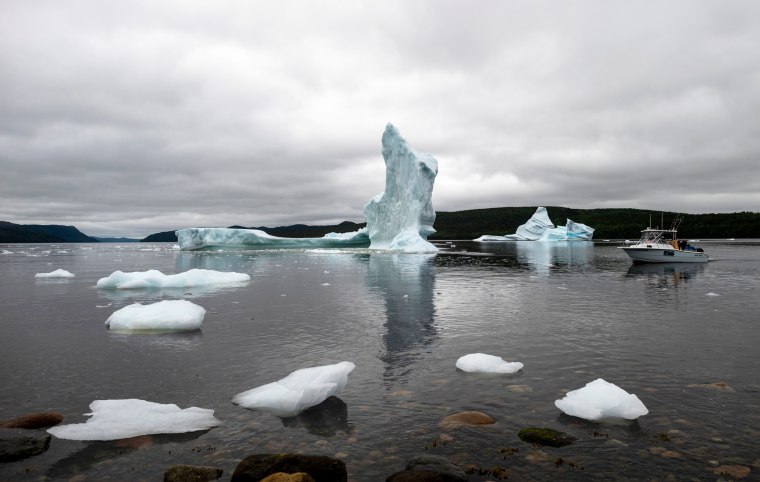Scientists are running out of extreme adjectives to describe the state of the world’s oceans.
Global sea surface temperatures are spiking off the charts. The North Atlantic Ocean, in particular, has for months been engulfed in what scientists have said is an “unprecedented” marine heat wave. The Gulf of Mexico and Caribbean basin have also been unusually warm. The waters off the coast of Florida topped 100 degrees F multiple times this week — temperatures comparable to a hot tub.
What’s more, some scientists say the worst may be yet to come.
“We’re not even at the height of the summer,” said Svenja Ryan, a physical oceanographer at the Woods Hole Oceanographic Institution in Massachusetts. “Typically, the ocean continues to warm until September, so I think certainly we can expect this heat wave to last into the fall.”
This month, parts of the Caribbean Sea and Gulf of Mexico were more than 5 degrees F warmer than normal. In recent days, a patch of the North Atlantic off the coast of Newfoundland, Canada — a region normally kept relatively cool by the Labrador Current — was an astounding 9 degrees F warmer than usual, according to Frédéric Cyr, a research scientist at Fisheries and Oceans Canada, a department of the Canadian government that oversees marine science and policy and manages the country’s fisheries.
Scientists pay close attention to marine heat waves because the world’s oceans are crucial for the planet's ability to store heat. Studies have found that Earth’s oceans have absorbed about 90% of the heat trapped on the planet from greenhouse gas emissions since 1970.
As climate change causes the world to warm, sea surface temperatures can offer clues about the health of these bodies of water. As such, the extent of the heat wave unfolding in the North Atlantic, its severity and its duration are all cause for alarm, Ryan said.
“As a scientist, you know this is well within the range of what climate models predict would happen at some point, but to see it actually happening is kind of scary,” she said.
Some impacts are being felt already. The soaring sea surface temperatures off Florida are imperiling the region’s coral reef. Scientists have warned that the heat wave could trigger mass die-offs of coral, which could have profound implications for marine ecosystems in the area.
Elsewhere in the Atlantic, researchers are tracking changes in the distribution of fish as the waters warm. Ryan said certain tropical fish species are expanding their range, venturing further north than normal. Other animals, such as whales, are shifting their movements to match their prey.
“We’re seeing some animals compress their habitats, or some shift latitudinally if they’re capable,” Ryan said. “Or, like the corals in Florida, they just have no chance and die off.”
Kathy Mills, a research scientist at the Gulf of Maine Research Institute, said the long-term consequences of such warm waters may not even be known because such conditions have no comparison in recorded history.
“This is out of the realm of anything we’ve observed or been able to observe in the past," she said, "So we don’t even have data to turn to in order to understand what the impacts of temperatures this hot for such large regions might be."
Many consequences are also not detectable right away, said Cyr.
“It’s a bit too soon to understand what’s going on,” he said, adding that capturing the full implications for fisheries, marine species and ocean health requires time — and plenty of data.
Mills similarly said that it can take months to conduct biological surveys and work with fisheries to measure outcomes. She said, however, that the warming observed in recent months has been unusually widespread.
“Globally there are very few places that are cooler than usual,” she said. “You would typically expect sort of a balance, but we have a large portion of the ocean that is hotter than long-term averages, and the certain regions experiencing these really exceptional temperatures.”
This year, El Niño conditions are also expected to play a role, compounding background warming from climate change. El Niño, a natural climate cycle characterized by warmer-than-usual waters in the central and eastern tropical Pacific Ocean, can have a significant effect on rainfall, hurricanes and other severe weather. El Nińo typically also increases average air and sea temperatures.
That means sea surface temperatures may continue to climb.
“The fact that this could be even more extreme if we had a strong El Niño already set up and in place is just shocking,” Mills said.

